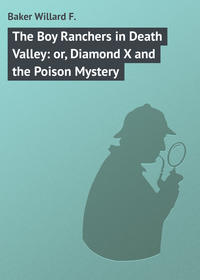
Bob Dexter and the Storm Mountain Mystery or, The Secret of the Log Cabin
“I come see mebby Senor Beegle let me try plant monkey nuts on his land,” explained Pietro.
“Mebby so they no grow where I put ’em,” and he waved his hand in the direction of Cliffside.
“I don’t believe anything would grow, the way you planted it,” chuckled Bob, remembering the deep holes the Italian had dug.
Pietro looked across the deserted garden. He saw where Jolly Bill had been trying for worms.
“Senor Beegle – he dig holes, too!” exclaimed the caller. He seemed strangely excited. “Mebby so he plant monkey nuts!”
“I don’t believe so,” stated Bob. “Hiram hasn’t any monkey. They have been digging worms,” he explained.
“Worms – what for worms?” asked the Italian with a vacant look.
“For fishing. That’s where they are, you know – after fish.”
“Oh, sure – feesh. Well, mebby so I leave these nuts for Senor Beegle – he plant them and try them – you t’ink?” He held the odd things out to Bob.
“You better come back and explain about them yourself,” said Bob. “I’m going after them now. Come back to-morrow.”
“Aw-right. I come back!”
The Italian did not seem disappointed. With a patience characteristic of his kind, he smiled and turned away. Bob watched until he saw the organ grinder tramping down the Storm Mountain trail.
Then Bob locked up the log cabin, hid the key where he had found it and took another road back to Cliffside in order to pick up Hiram and Jolly Bill.
They had had good luck fishing, contrary to what Bob had expected and he brought home to his aunt some welcome specimens of the lake. Hiram was left at his cabin and Jolly Bill at the Mansion House.
“Well, I know one thing I’m going to do,” said Bob to himself that night in his room. “I’m going to give a party!”
Rather a queer decision you might think, until you knew the reason for it.
There was a room in the headquarters of the Boys’ Athletic Club available for gatherings of various sorts. It could be hired for dances and parties by the members or friends of the latter, and often the boys and girls would give little affairs there.
So it did not surprise the chums of Bob Dexter to receive, in the next few days, invitations to a little affair of this sort at the club. On the bottom of some invitations was a line:
“Please bring peanuts.”
“What’s the idea, Bob?” asked Ned, reading this command. “Aren’t you going to feed us?”
“Oh, yes, but the peanuts are for the monkey.”
“What monkey?”
“The organ grinder’s.”
“Is he coming to the party – I mean the dago?”
“Yes, and he’s going to bring his organ and monkey.”
For a moment Ned stared at his chum, and then, seeing that Bob was serious, Ned broke out into a laugh.
“Oh, ho! I get you!” he chuckled. “It’s a dandy idea! Organ music and monkey tricks at your party! Quite a stunt! Good idea!”
“Yes, I think it’s quite an idea,” said Bob quietly.
CHAPTER XVIII
THE MAN WITH THE HOOK
Many of Bob Dexter’s friends came to his party – in fact nearly all of them were present. Whether it was the admonition to “bring peanuts,” or whether Ned Fuller had spread the news that there would be “something doing” at the affair, is not clear. At any rate there was a goodly attendance in the club, where Bob had arranged to entertain his guests.
At first even Ned had been somewhat skeptical about Bob’s expressed intention of having “the dago,” as they jokingly called the Italian, at the party, with his organ and monkey. And many another lad, to whom Ned imparted the news, smiled knowingly and said:
“Aw, quit your kidding!”
“No, it’s a fact – honest!” Ned declared.
And so it proved.
For when the lads and lassies (for the girls were invited) filed into the hall, there, in a place of honor on a platform, was the Italian organist and his pet simian.
“Oh, but we can’t dance to that doleful music!” objected Nina Farnsworth as she saw what some of the girls called the “orchestra.”
“Don’t worry!” laughed Blanche Richmond, “Bob has the jazz band from Cardiff over – talk about music – my feet are aching to begin!”
Bob had his own special object in hiring Pietro to come to the party with Jacko, and making dance music wasn’t it. In due time it shall be made known to you.
And, knowing that his young friends liked to dance as much as he did himself, Bob had provided the wherewithal, so to speak. Cardiff – the city where the “elephant man” had engaged the attention of the chief and the young detective that rainy night – Cardiff had an orchestra of young men, noted for their jazz ability – that is if you grant it takes any ability to play jazz music. And this Bob had engaged.
It was the custom for members of the Boys’ Athletic Club to take turns giving little affairs, such as dances and parties, so it was not unusual that Bob should do so.
He had been a little diffident about approaching Pietro on the matter, but he had put it in such a way that the Italian had consented after a little thought, and a quick, shrewd look into Bob’s face.
“You no maka bad tricks with Jacko?” he asked.
“Of course not!” cried Bob. “You and the monkey will be treated perfectly fair. It’s just that I want a little something different at my party – something to make the boys and girls laugh. The monkey will do that.”
“Oh, sure! Jacko – he do many tricks. I show you!”
Bob had called on the queer Italian at the latter’s room in the Railroad House. It was a poor enough place to live, but it suited Pietro and others of his kind.
“Sure, the dago’s up in his room,” Mike Brennan, proprietor of the hotel had said in response to Bob’s inquiry. “Go on up – we don’t keep elevators or bell boys here!”
So Bob had found the man in his dirty, dingy room, with a heap of rags in the corner for the monkey to sleep on.
“He do many fine tricks,” said the Italian, once he understood the object of Bob’s call. And he put Jacko through his stunts.
The compensation was agreed upon, Bob giving the man a few dollars more than he had asked, and now it was the night of the party, and Pietro, his organ and Jacko were on hand.
“Oh, isn’t he a dear!”
“So cute!”
“Will he bite?”
“I’d love to hold him! May I?”
Thus the girls in raptures over the monkey which sat perched on his master’s organ, his wizened face looking pathetically at the gay throng about him.
“Jacko no bite!” murmured Pietro, and he seemed proud of the attention his simian was attracting. “You take him!”
He held the little creature out to Nina, but she drew back with a scream of real or pretended fright.
“I’d love to hold him!” exclaimed Mary Wilson. “Do let me! Come on, you queer little imp!” she murmured.
The monkey whimpered but went to her and put his little hairy paw about the girl’s neck.
“Oh, I wouldn’t do it for the world!” cried Nina.
“He’s a dear!” murmured Mary. “His hands are as soft as a baby’s.”
The monkey readily made friends, and he had a feast of peanuts, for all the boys had done as Bob requested, and there were enough of the goobers to last Jacko a year, it seemed.
“Go on – play something!” cried Bob to his organ orchestra, and the wheezy instrument was set in operation. The boys and girls laughed, particularly when Jacko did some of his tricks, which he performed better to the strains of the organ, it seemed.
Then the jazz took its turn and the party was on.
This isn’t a story of Bob Dexter’s party, and I don’t propose to tell you of the jolly times that went on there – for it was a jolly affair – no doubting that. The jazz was of the jazziest, the monkey and organ made a great hit, and the refreshments were all that could be desired.
But there was something more than this.
It would not have been exactly correct to say that Bob Dexter gave this party solely for the purpose of advancing him toward a solution of the Storm Mountain mystery – to help him discover the secret of the log cabin. For he had been planning to give a party for six months back – before he ever even dreamed that Hiram Beegle would be robbed of the treasure map.
However, the party now fitted well into Bob’s plans, and he took advantage of it to carry out a scheme he wanted to try.
The party was at its merriest, and the boys and girls were gathered in a ring about the organ grinder and his monkey, when Bob touched Ned Fuller on the arm.
Ned, who had been tossing nuts to the monkey, turned about and, in answer to Bob’s nod of the head, followed his chum to a quiet corner.
“What’s up?” asked Ned. “Want me to help you dish out the ice cream, Bob?”
“No, the steward will do that.”
“But something’s up – you look serious. Those fellows haven’t got old Hiram for good this time; have they?”
“Not that I know of. But I want you to take charge of things here for a little while.”
“Take charge of things?”
“Yes. Take my place – act as a sort of deputy host”
“What’s the idea?”
“I’m going away for a while.”
“You aren’t sick, are you?”
“Far from it. But I want to do something. I may as well tell you what it is, and then, if anything happens, you’ll know where I am.”
“Say, this seems like it was getting serious!” murmured Ned, looking closely at his chum. “You haven’t caught that Rod chap, have you?”
“Well, no, not exactly, but I may get on his track, if I have luck. Listen, Ned. I had that Italian come here to-night for a special purpose.”
“And a good purpose it was, I’ll say if you ask me. He’s the hit of the evening, outside of myself!” And Ned puffed out his chest.
“Stow that talk!” chuckled Bob. “But I mean I got the Italian here so he would be out of his room at the Railroad House.”
“Ah, noble youth! Providing entertainment – to say nothing of food – for the poor and downtrodden! Atta boy, Bob!”
“Cut it out! I don’t mean that way! I asked the dago here so he wouldn’t be in his room.”
“Naturally if he’s here he can’t be in his room,” bantered Ned. “Two objects can’t occupy the same place at the same time. Neither can even an Italian organ grinder be in two places at once. Q.E.D. you know, Bob!”
“Oh, will you be serious!”
“Is this serious?” asked Ned.
“It may be – yes. Listen! I’m going out – I’m going to take a run down to the Railroad House and make a search through the room of this fellow. That’s why I got him here – so as to give me a clear coast. I can run down in my flivver and be back inside of half an hour. Can you keep things moving that long – until I come back?”
“I’ll try, even if I have to stand on my head to amuse ’em!”
“Good boy! But don’t do anything rash. Don’t raise a rumpus, and if any one asks for me cover my absence. Above all don’t let the dago know I’ve gone to his dump.”
“Trust your old college chum for that, Bob. I’m Little Old On The Job for yours truly. Shoot! When you going?”
“Right away. It will soon be time to serve the ice cream and cake, and they can think I’m looking after that. Mum’s the word now!”
“Mum is right!” echoed Ned with a wink.
They had conversed rapidly and in low voices in one corner of the room, while nearly all the guests were gathered about the monkey and the Italian.
Seeing that they were likely to be thus amused for some time, Bob slipped out. Ned was on the alert to forestall possible embarrassing questions.
“I’m going up to the Italian’s room a minute,” said Bob to the Railroad House proprietor, a little later.
“Help yourself,” indifferently replied Mike Brennan. “He’s out, though.”
“Yes, I know. He’s entertaining over at the Boys’ Club.”
“Oh, sure! Now I remember ye!” cried Mike. “You’re th’ lad that come and hired him. I s’pose he forgot his music!” and he chuckled. “So ye had t’ come for it, did ye? Sure these dagos aren’t any good, though Pietro is as decent as any. Go on up wid ye!”
Bob made his way along the dimly-lighted hall until he came to the door of the room where the Italian slept. Bob had been in the Railroad House before, once when it was raided by the police. He knew that the locks on the doors were old-fashioned and that a buttonhook would open most of them. An ordinary slender key, with one ward on it, would more than do the trick, and Bob had several keys of the skeleton variety.
He was not surprised to find the door unlocked, when he tried it before using any of the keys he had brought. But if he wasn’t surprised at the ease with which he entered, he was surprised at the sight he saw when he pushed back the portal.
For the room was lighted by a dim gas jet, partly turned down. And in the sickly gleam Bob saw a man in the room – a man stooping over a chest in one corner.
At first Bob believed that Pietro had gotten there ahead of him. But the manifest impossibility of this soon made itself known to him.
The man bending over the Italian’s chest straightened up suddenly at the noise of the opening door.
He was a man of rough appearance, and his left hand was missing. In place of it was an iron hook – for all the world like Captain Cuttle.
With a sharp intaking of his breath, the man with the hook faced the young detective. Bob, on his part, could not repress a gasp of surprise.
“Well!” snarled the man at last. “What do you want?”
“Who are you?” demanded the lad.
The two glared at each other in the dim light of the turned-down gas jet.
CHAPTER XIX
THE LAST CHORD
Bob Dexter had to do some quick thinking. He had not counted on finding any one in the Italian’s room, when he left the party to make a quick survey of the sordid apartment. That is all Bob wanted to do – to look about and either confirm or do away with certain suspicions that had entered his mind.
For he had begun to get suspicious of Pietro, in spite of the ingenuous ways of the smiling Italian, and the suspicions began when the man hired the bramble patch from Judge Weston, with the avowed purpose of planting food for the monkey.
Now that he had come, and found a stranger in the room, and a sinister stranger, with his ugly iron hook in place of a hand and arm – Bob hardly knew what to do or say. He could not make the inspection he wished with this suspicious man present.
And the man with the hook was not only suspicious in himself, but he regarded Bob with suspicion. The lad knew that at once – it was evident not only in his manner but in his look.
Quickly Bob’s eyes roved about the room, seeking that on which he could either build further suspicions, or begin to manufacture new ones. However, what he wanted could not be found by a casual inspection.
What Bob was after was something to connect this man with the sea. Since the time he had seen him idly plaiting sailors’ knots in the monkey’s cord, the lad had had an idea, in the back of his brain, that the fellow at one time had been a hand before the mast. But that one little slip, if such it was – the idle tying of the odd knots – was the only evidence, so far, that Bob had. He wanted more.
Hence, when he had decided to give his party, and had thought of hiring Pietro, the idea had occurred to him that he could easily slip away for a half hour or so and look through the man’s room. Some of the many objects, associated with sailors from time immemorial, would turn the trick and prove that Pietro was not exactly what he pretended to be – a traveling maker of music.
Whence had come this man with the iron hook strapped fast to his arm? He might have stepped directly from the pages of “Dombey and Son.” Who was he?
That is what Bob wanted to know.
For perhaps half a minute – and that is a long time when under such stress as were the two – for perhaps half a minute they remained staring at each other – Bob tense and ready for anything that might happen – the man with the hook ugly and suspicious.
Then, at last, the man seemed to give way to the lad. At least he did to this extent that the angry look faded from his face, and he laughed – albeit uneasily.
“Guess you got in the wrong room, didn’t you, lad?” asked the man. “You don’t belong here!”
Bob resolved to chance all on a bold throw. He felt pretty certain that Pietro had not taken in a partner. The man did not seem to be an Italian – far from it. And neither Pietro nor the landlord had said anything about a visitor.
Yet here was this man with the hook making himself very much at home in Pietro’s place. So Bob resolved on a bit of bluff.
“Aren’t you in the wrong room?” came the demand again.
“No more than you are!” countered Bob shortly. “Who are you, and what are you doing in Margolis’ place?”
The shot went home.
“Oh, you know him, do you?” asked the man.
“Of course I do!” and Bob followed up the advantage he thought he had gained. “I hired him to play at a party for me to-night.”
Bob would have been stuck there but for something that came into his mind. How could he explain his presence there in the absence of the room’s rightful inmate, when he had admitted that Pietro was at the party?
The lad, somehow, remembered that hand organs are operated by a round piece of brass, called a “barrel,” and that on this barrel are points of steel, like tiny pins. As the barrel revolves, to the turning of the crank, which operates a worm gear, these points open valves, allowing air to pass over the brass reed-tongues, thus producing “music.” Each barrel has on it a certain number of steel points, set in such a way that they play a set number of tunes, no more. To enable a hand organ, or a street piano, to play other melodies it is necessary to insert another barrel, with different pins on.
Why would not his party guests become tired of a repetition of a set number of tunes? Wouldn’t they demand others? And to get them it would be necessary to insert a new barrel in the organ, even as a new roll is put in a player piano.
“I have it!” mused Bob to himself. “I came here to get another barrel so Pietro could play other tunes. That will do the trick!”
So he spoke up and said:
“Have you seen anything of the other barrel?” He was careful not to say that he had come for it, for that was not his original object.
“What barrel?” asked the man.
“To go in the organ – to play different tunes,” the lad explained.
“Huh! I don’t know anything about tunes!” growled the man with the hook. “If Pietro sent you for it – all right. Take it if you can find it. But I didn’t come here for that. What time’s he coming back from this party of yours?”
“Oh, not for a long while yet. It’s only just started.”
“Urn! Well, I’d like to see him. I got particular business with him. He doesn’t know I’m here, but I am!”
The man flung himself into a chair which creaked under his weight.
“Look for the barrel – or whatever it is if you like,” he growled.
But now Bob had lost all desire to explore the dirty room and its almost as dirty contents. Suddenly another idea had come into his mind.
This man – the stranger with the hook – had claimed to be a friend to the Italian. Otherwise he would not have been allowed to enter his room in the absence of Pietro – as was evident he had done. Though for that matter Mike Brennan did not operate his Railroad House with any real regard for his guests. Those with valuable possessions did not put up at his hotel.
But this man’s air was anything but friendly. Somehow Bob got the impression that the visit was distinctly unfriendly. The man with the hook seemed angry. It was evident in his words and manner.
“No, I won’t disturb things,” said Bob, as he prepared to leave. “I’ll send Pietro for it himself. He’ll know just where it is. I’ll go back and send him.”
“And tell him to hustle back here!” growled the other. “I’ve waited long enough – I’m getting tired. Tell him Jake Dauber is waiting for him.”
“Jake Dauber!” repeated Bob.
“That’s the name – yes – want me to write it out for you?” there was anger and impatience in the voice.
“Oh, I think I can remember,” said Bob, vainly trying to piece together broken bits of the puzzle that was in his mind. “I’ll tell him.”
He did not linger longer. There was no use. He could not have done what he came for. But perhaps now there would be no need. The man with the hook presented a new complication in the Storm Mountain mystery.
“I’ll tell him – good-night – Mr. Dauber,” murmured Bob as he stepped out into the dim hall.
“Um!” was all the answer he received. Though the man with the hook shouted after him: “Tell him to git a move on.”
At first Bob had, it in mind to disobey the injunction he had received. He wasn’t going to deliver the message to the Italian. His chief objection to this was that to do so he would have to admit having been in the room of Pietro.
“But he’ll know it anyhow,” decided Bob. “Ill tell him, after all. Or, rather I’ll give him the message. Then later, if Pietro wants to know why I went to his room I can tell him I thought maybe he had another barrel to his organ. And I really wish he had – his tunes are getting monotonous.”
This was a way out – a fair and square way.
“I’ll tell him about the man with the hook!” decided Bob.
And when he gave the message, such a look of terror and despair came over the face of the Italian that Bob felt sorry for him. The jazz orchestra was playing its best or its worst, however you look at it, and the Italian had nothing to do. The guests were dancing and had partaken of some of the refreshments. No one seemed to have noticed the short absence of the young detective.
“You – say – man – with hook arm?” faltered the Italian.
“Yes – at your hotel – in your room. He wants you.”
“Wants me?”
“Yes – in a hurry.”
“Oh – I – I go – but I promise you, Senor Dexter – I say I come to make monkey do tricks at your party – I play – ”
“You’ve played enough – you’ve earned your money,” said Bob with a smile. “Better go back. That man with the hook – he’s anxious to see you. Who is he? He says his name is Dauber.”
“He is – one devil!” hissed the Italian, as, shouldering his instrument, and calling to his monkey, he hurried out.
“There’s going to be trouble there, if I’m any good at guessing,” declared Bob to himself. “And after this party I’m going back to the Railroad House and see what has happened.”
It was early morning when the last guest had gone, and Bob jumped into his flivver, making his way to the Railroad House. Mike Brennan boasted that he never closed, that he had “lost the key,” and couldn’t. Consequently the place was lighted even at the hour of two in the morning.
“What, you back again?” growled Mike, who acted as his own night clerk.
“Yes. Is that Italian here?”
“Who, Pietro and his monkey?”
“Yes.”
“No.”
“You mean!” exclaimed Bob. “You mean he – ”
“He’s gone – yes! Paid what he owed and skipped out – he and that feller with the iron hook that came earlier in the evening. And say, there was something queer between them two.”
“Something queer?” questioned Bob.
“Sure! That dago was in a sweat of fear of the man with the hook. Why, even the monkey seemed to be scairt! I never see anything like it. Honest I didn’t.”
“Maybe they had some sort of a quarrel,” suggested Bob.
“Maybe. Though I didn’t hear anything of that. I did hear something, though, that made me think there was a phoney game in it.”
“What did you hear?” asked Bob.
“Why all along this dago has been calling himself Pietro – Pietro Margolis, you know.”
“Yes,” agreed the lad.
“Well, when he was going out – after paying what he owed me – and I must say he was fair and square – when he was going out he gave one last squeak to his organ – queer sort of a squeak, too.”
“Yes,” said Bob. “A sort of last chord, perhaps.”
“Maybe; but then I don’t know nothing about music. But what I started to say was this fellow’s name isn’t Pietro at all!”
“It isn’t?”
“No. This man with the hook called him Rodney!”
You could almost have knocked Bob Dexter over with a feather then.
CHAPTER XX
NEW SUSPICIONS
Realizing that it would not be wise to show too much emotion and surprise in front of Mike Brennan, the young detective controlled his astonishment as much as possible, though it was difficult.
“Oh, well,” he murmured, as if it was the most natural thing in the world, “maybe Rodney was Pietro’s middle name.”
“Maybe, but I don’t believe so,” asserted the proprietor of the Railroad House. “Rodney isn’t a dago’s name at all, and, what’s more, I don’t believe this chap is an Italian at all.”






